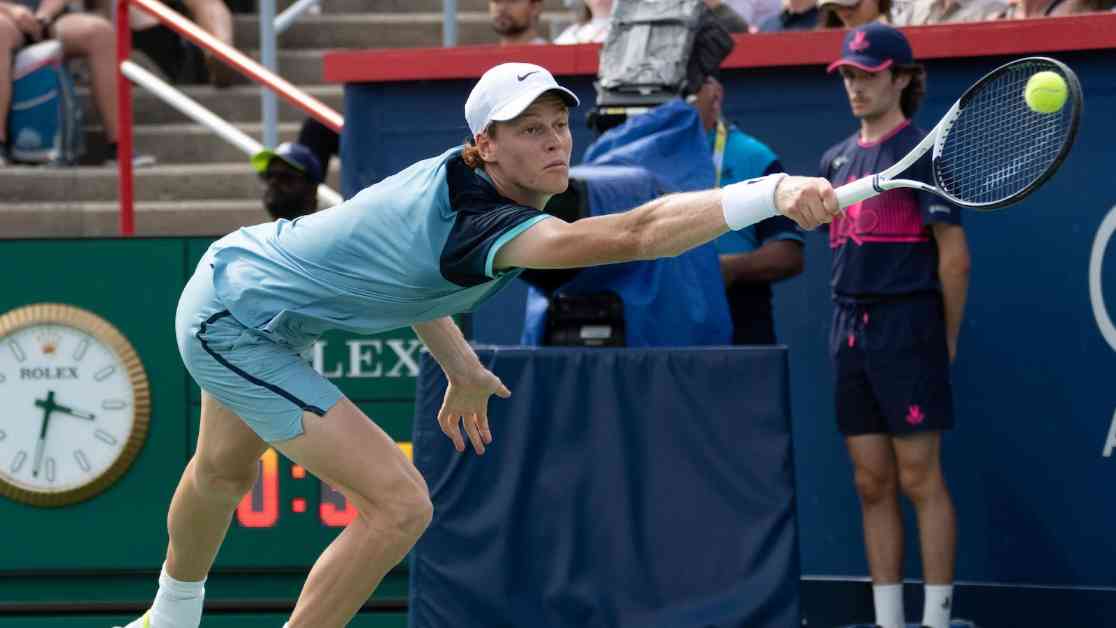Jannik Sinner’s Unanswered Doping Allegations and Player Reactions
No. 1-ranked men’s tennis player Jannik Sinner is set to compete in the upcoming U.S. Open in New York, despite recent revelations that he tested positive twice for a banned anabolic steroid in March. The news of Sinner’s doping allegations only came to light on Tuesday, sparking a wave of questions and criticism from fellow players regarding the handling of the situation.
Sinner, a 23-year-old Italian, ascended to the top spot in the ATP rankings in June and is considered a rising star in the world of men’s tennis. With an impressive record of 48-5 and five titles under his belt, including a recent victory at the Cincinnati Open, Sinner’s career has been on an upward trajectory.
The banned substance in question, Clostebol, is an anabolic steroid commonly found in over-the-counter ointments and sprays in certain countries, such as Italy. While it is used to treat minor injuries like cuts and scrapes, Clostebol is also known to enhance athletic performance and is prohibited in competitive sports.
Sinner’s positive tests for Clostebol occurred during the Indian Wells tournament in California, with an out-of-competition sample also yielding the same result eight days later. The tennis star was provisionally suspended following the two positive tests but appealed the bans, claiming that he had inadvertently been exposed to the steroid.
According to Sinner, a member of his team purchased a spray containing Clostebol in Italy, which was then used by a physiotherapist to treat a minor injury. The physiotherapist later provided Sinner with a massage, inadvertently transferring the substance to him. Both the International Tennis Integrity Agency (ITIA) and an independent tribunal accepted Sinner’s explanation, ruling that he was not at fault or negligent in the matter.
Despite the exoneration, Sinner was required to forfeit prize money and ranking points earned at Indian Wells, amounting to $325,000 and 400 points, respectively. The handling of Sinner’s case has drawn comparisons to past doping incidents in tennis, including reduced suspensions for high-profile players like Maria Sharapova and Simona Halep.
The issue has sparked a debate within the tennis community, with players expressing varying opinions on the matter. Wimbledon semifinalist Denis Shapovalov criticized what he perceived as different rules for different players, while others like Nick Kyrgios and Tennys Sandgren weighed in on the situation, with Kyrgios calling for a ban and Sandgren questioning the fairness of the treatment compared to other players.
The controversy surrounding Sinner’s doping allegations raises broader questions about transparency and fairness in the sport of tennis. As the top-seeded player in the upcoming U.S. Open, Sinner is likely to face increased scrutiny from both fans and fellow athletes during the tournament.
Reactions from the Tennis Community
The handling of Jannik Sinner’s doping allegations has elicited a range of reactions from players, coaches, and fans within the tennis community. While some have expressed support for Sinner and his explanation of the situation, others have raised concerns about the perceived leniency shown towards top-ranked players in similar circumstances.
Notable figures in the sport, such as 18-time Grand Slam champion Chris Evert, have suggested that there may be a level of protection afforded to top players like Sinner when it comes to doping cases. Evert pointed out that the delay in disclosing the positive tests and the subsequent resolution may indicate a preferential treatment for high-profile athletes.
Furthermore, the comparison to previous doping cases, where suspensions were reduced on appeal for well-known players, has fueled speculation about the consistency and equity of anti-doping measures in tennis. The disparity in sanctions for missed tests, as seen in the cases of Jenson Brooksby and Mikael Ymer, further highlights the complexities of the anti-doping system in the sport.
As the tennis world awaits Sinner’s participation in the U.S. Open, the unresolved doping allegations continue to cast a shadow over his achievements and reputation. The tournament will serve as a litmus test for how the tennis community responds to the controversy and whether Sinner can maintain his status as the top-ranked player amidst the scrutiny.
Implications for Anti-Doping Measures in Tennis
The case of Jannik Sinner’s doping allegations has brought to the forefront the challenges and complexities of anti-doping measures in professional tennis. While the sport has stringent protocols in place to prevent the use of performance-enhancing substances, instances like Sinner’s raise questions about the effectiveness and fairness of the system.
One of the key issues highlighted by Sinner’s case is the potential for inadvertent exposure to banned substances, particularly in cases where athletes rely on their support teams for medical treatment. The blurred lines between legitimate medical care and doping violations underscore the need for clearer guidelines and education within the tennis community.
Additionally, the perceived discrepancies in how doping cases are handled for different players, especially those at the top of the rankings, raise concerns about the consistency and transparency of anti-doping enforcement. The need for a level playing field and equal treatment under the anti-doping regulations is essential to maintaining the integrity of the sport.
Moving forward, the tennis governing bodies must address these challenges and work towards a more robust and equitable anti-doping framework. Enhanced education, stricter monitoring, and transparent communication are crucial in upholding the values of fair play and integrity in tennis, ensuring that all athletes are held to the same standards of conduct.
In conclusion, the unresolved doping allegations against Jannik Sinner serve as a wake-up call for the tennis community to reevaluate its approach to anti-doping measures and uphold the principles of fairness and transparency in the sport. The upcoming U.S. Open will provide a platform for further discussions and reflections on how to strengthen the integrity of tennis and protect the rights of all athletes.












